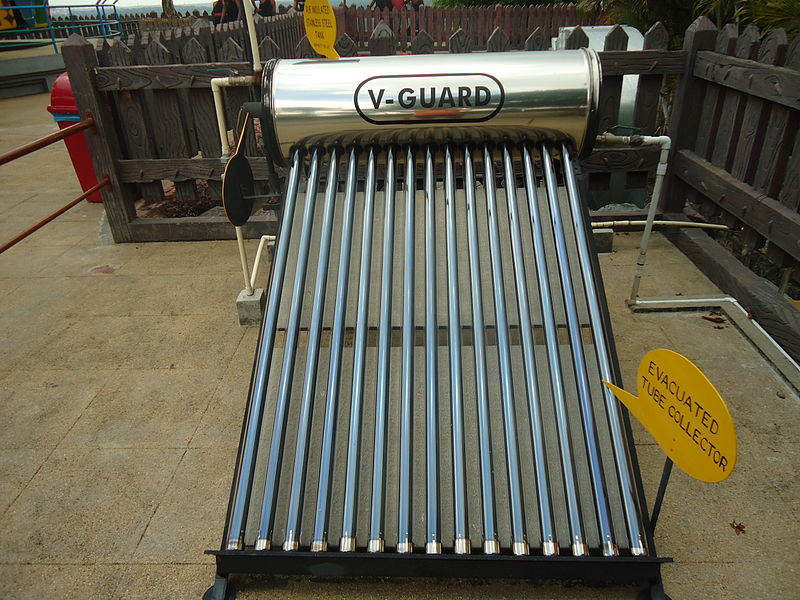One of the big puzzles about the Green Energy Market Securitization program is why it excludes loans for solar water heaters. These certainly offer the biggest bang for the buck to any customer wanting lower utility bills. And the cost is a fraction of what it would take to install a solar photovoltaic system.
But solar water heaters, though accounting for roughly a third of an average household’s energy consumption, are absent from the list of technologies approved for GEMS loans.
Why?
This question was raised by Life of the Land when it intervened in the Public Utilities Commission docket approving the loan program.
“Solar water heaters save more dollars per dollar invested than PV panels, they have shorter payback periods, but more importantly, solar water heaters decrease peak load…,” wrote Henry Curtis, the group’s vice president. “Will those receiving PV financing have to install solar water heaters before acquiring PV?”
The response of the Department of Business, Economic Development, and Tourism was that the Public Utilities Commission “intends to support the financing and deployment of solar water heaters” through its on-bill financing program (still a work in progress). GEMS, on the other hand, “will primarily support solar PV and technologies that mitigate challenges related to interconnection.”
Nor would the GEMS program require customers to install solar water heaters before PV. “GEMS is open to customers who want to install solar water heaters,” wrote deputy attorney general Gregg Kinkley for the department. But “mandating the installation of solar water heaters may make the process less appealing and more burdensome for both customers and deployment partners, leading them not to use GEMS and potentially not to install distributed generation altogether.”
“As a public-private partnership, it is essential that [DBEDT] work with existing market players and deployment partners to have GEMS augment and expand the market to the underserved – already a new concept to deployment partners. Adding additional requirements and components that do not integrate with their current processes will likely reduce the usefulness and impact of the program,” Kinkley wrote.
In an interview, Curtis noted that if solar water heaters and other efficiencies were in place before the GEMS loans were obtained, it could lower the cost of the solar PV installation, since the customer’s electrical load would be substantially reduced.
Mark Glick, the head of the state’s Energy Office, was asked why financing for solar water heaters was excluded from the GEMS program.
“There was a philosophic decision that we wouldn’t do what … was being done by the energy efficiency and conservation block grant program administered by the [federal] Department of Energy, where they say you can’t get a loan for a PV system until you go through a step process, an efficiency audit, all that. … We acknowledge there are other programs out there, particularly Hawai`i Energy, to support rebates for solar water heaters as well as other programs being contemplated by the PUC, so we weren’t going to establish rules to establish efficiency first. We didn’t want to slow up the process for all of the folks who have either already installed [solar water heaters] or who have gone through audits or are pursuing other measures independently. It was a choice that we didn’t want to impede progress on moving forward with somebody who knows what they want to do.”
* * *
Water Heater Variances
By the Thousands
Seven years ago, the Hawai`i Legislature passed a law forbidding counties to issue building permits after January 1, 2010, for the construction of any house that did not include a solar water heater. Variances were allowed in limited circumstances, but they had to be approved by the state energy resources coordinator.
In 2009, the circumstances that qualified for a variance were further restricted, with the Legislature adding, in the “Findings” section of the bill, that it was the Legislature’s intent “that the variances … will be rarely, if ever, exercised or granted because the burden of proof will lie with the applicant to demonstrate that a solar water heater system, regardless of location or circumstance, is not cost-effective in the context of a 30-year mortgage.”
So, how is this working out?
Not that well, apparently.
DBEDT’s Glick, who signs the variances, was asked how many variances had been approved.
“Far too many,” he answered. “They come from the Big Island and Kaua`i, by the thousands, maybe three or four thousand a year. … You’ve got a number of engineers, architects, and contractors who have figured out how to help homeowners skirt the law. So we have to work harder on that. … It does concern us.”
— Patricia Tummons

